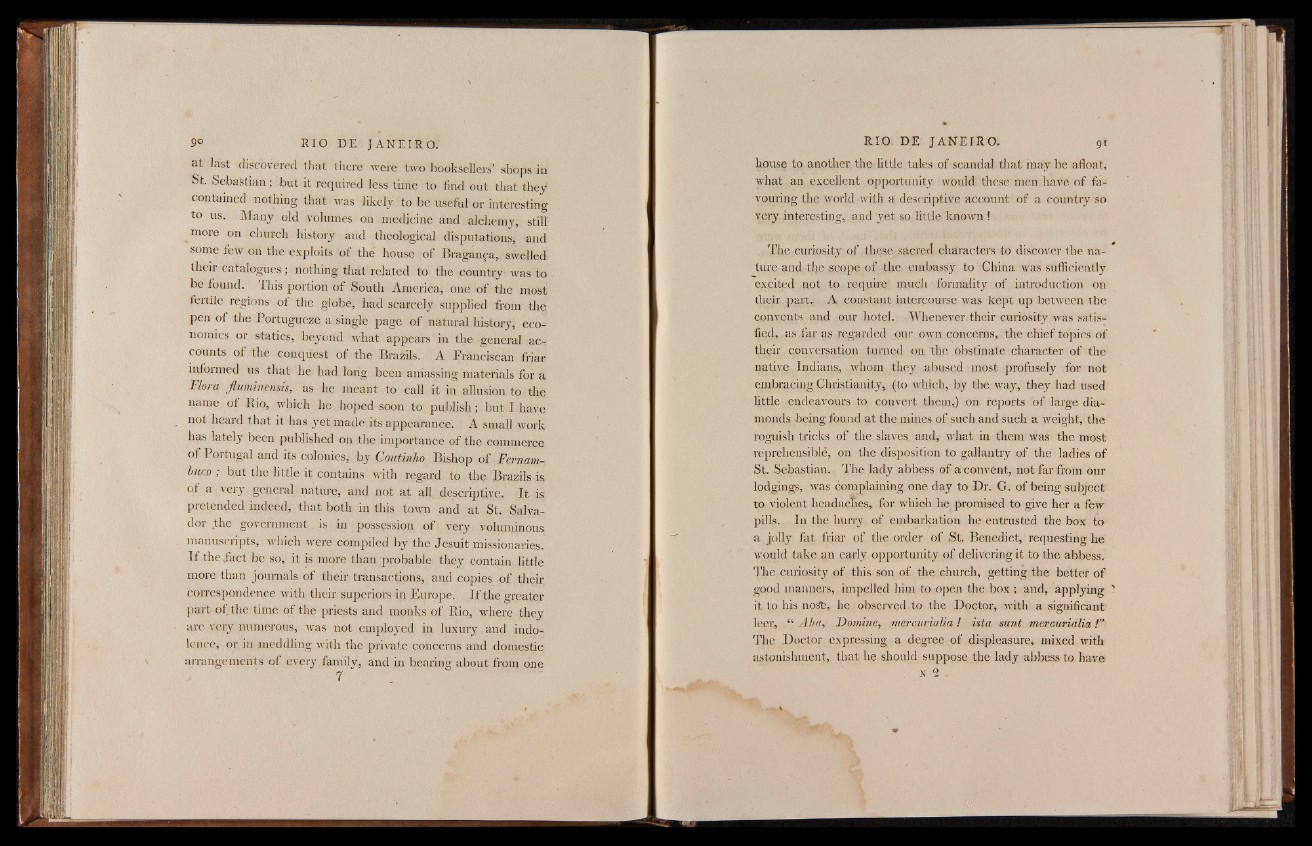
at last discovered that there were two booksellers’ shops in
St. Sebastian; but it required less time to find out that they
contained nothing that was likely to be useful or interesting
to us. Many old volumes on medicine and alchemy, still
more on church history and theological disputations, and
some few on the exploits of the house of Braganfa, swelled
their catalogues; nothing that related to the country was to
be found. This portion of South America, one of the most
feitile regions of the globe, had scarcely supplied from the
pen of the Portugueze a single page of natural history, economics
or statics, beyond what appears in the general accounts
of the conquest of the Brazils. A Franciscan friar
informed us that he had long been amassing materials for a
Flora fluminensis, as he meant to call it in allusion to the
name of Rio, which he hoped soon to publish; but I have
not heard that it has yet made its appearance. A small work
has lately been published on the importance of the commerce
of Portugal and its colonies, by Coutinho Bishop of Fernam-
bu.co ; but the little it contains with regard to the Brazils is
of a very general nature, and not a t all descriptive. I t is
pretended indeed, that both in this town and at St. Salvador
the government is in possession of very voluminous
manuscripts, which were compiled by the Jesuit missionaries.
If the Nfact be so, it is more than probable they contain little
more than journals of their transactions, and copies of their
correspondence with their superiors in Europe. I f the greater
part of the time of the priests and monks of Rio, where they
are very numerous, was not employed in luxury and indolence,
or in meddling with the private concerns and domestic
arrangements of every family, and in bearing about from one
7
house to another the little tales of scandal that may be afloat,
what an excellent- opportunity would these men have of favouring
the world with a descriptive account of a country so
very interesting, and yet so little known!
The curiosity of these sacred characters to discover the nature
and the scope of the embassy to China was sufficiently
excited not to require much formality of introduction on
their part.; A constant intercourse was kept up between the
convents and our hotel. Whenever their curiosity was satisfied,
as far as regarded our own concerns, the chief topics of
their conversation turned on the obstinate character of the
native Indians, whom they abused most profusely for not
embracing Christianity, {to wdiich, by the way, they had used
little endeavours to convert them,) on- reports of large diamonds
being found at the mines of such and such a weight, the
roguish tricks of the slaves and, what in them was the most
reprehensiblé, on the disposition to gallantry of the ladies of
S t Sebastian. The lady abbess of a convent, not far from our
lodgings, was complaining one day to Dr. G. of being subject
to violent headaches, for which lie promised to give her a few
pills. In the hurry of embarkation he entrusted the box to
a jolly fat friar of the order of St. Benedict, requesting he
would take an early opportunity of delivering it to the abbess.
The curiosity of this son of the church, getting the better of
good manners, impelled him to open the box ; and, applying
it to his noSfc, he observed to the Doctor, with a significant
leer, “ Aha, Domine, mercurialia! ista sunt mercurialia!"
The Doctor expressing a degree of displeasure, mixed with
astonishment, that he should suppose the lady abbess to have